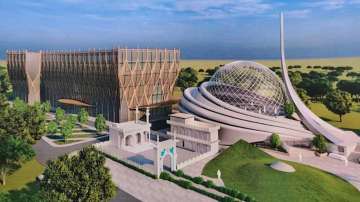The Ayodhya mosque project in Dhannipur village will formally begin on Republic Day (January 26). Besides a mosque, the project at a five-acre plot includes a hospital, a museum, a library, a community kitchen, the Indo-Islamic Cultural Research Centre and a publication house.
Athar Hussain, secretary and spokesperson of the Indo-Islamic Cultural Foundation (IICF), said that the national flag will be hoisted on the five-acre plot of the project at 8.30 am on January 26. It will be followed by plantation of tree saplings by the chief trustee and the member trustees of the IICF.
The 15-member IICF was constituted last year by the Uttar Pradesh Sunni Central Waqf Board (UPSCWB) for the construction of a mosque on five acres of land allocated to it in Raunahi in Ayodhya. The mosque is coming up in Ayodhya pursuant to the Supreme Court's November 9, 2019 verdict in the Ram Janmabhoomi case.
"At a meeting of the Indo-Islamic Cultural Foundation (IICF), it was decided that Republic Day will be celebrated with the start of the Dhannipur Mosque Project, which includes a hospital, a museum, a library, a community kitchen, the Indo-Islamic Cultural Research Centre, a publication house and a mosque," Athar said on Sunday.
READ MORE: President donates Rs 5 lakh for Ram Mandir as fund collection drive begins
At a virtual meet chaired by IICF president Zufar Ahmad Farooqi and attended by all the nine trustees, the progress of the trust activities, especially the procedural delay in getting the 12-A/80-G clearances under the Income-Tax Act and the proceedings for the opening of an FCRA account, was discussed, the statement said.
"It was decided to make a formal beginning of the project by applying for the plan clearance from the Ayodhya District Board and start the soil testing process at the five-acre plot," it added.
As the focus of the project is to give community service in the area with a determined effort to create awareness on climate change, Hussain proposed that the formal start of the project should be made by planting tree saplings on the five-acre plot of land.
READ MORE: How old is Ram Setu? ASI approves research to determine its age and how it was formed
As envisaged in the project, a green area, which will have plants from all over the world -- from the Amazon rainforest to areas in Australia that report bushfires -- and from all different geographical regions of India will be developed to create awareness on the imminent threat posed by climate change.
Earlier, Hussain had said a mosque measuring 15,000 square feet will be built in Ayodhya's Dhannipur village. It will be of the same size as that of the Babri mosque. The shape of the mosque may be completely different from that of other mosques. It may be square-shaped like the Kaaba Sharif in Mecca, as hinted by the architect, SM Akhtar.
After a protracted legal tussle, the apex court on November 9, 2019 ruled in favour of the construction of a Ram temple at a disputed site in Ayodhya and directed the Centre to allot an alternative five-acre plot to the Sunni Waqf Board for building a new mosque at a "prominent" place in the holy town in Uttar Pradesh. The state government has allotted the plot in Dhannipur for the construction of the mosque on the directions of the Supreme Court.
READ MORE: 2020 India Recap: From Ram Mandir bhoomi pujan to Bihar election – Top defining stories
Latest India News
